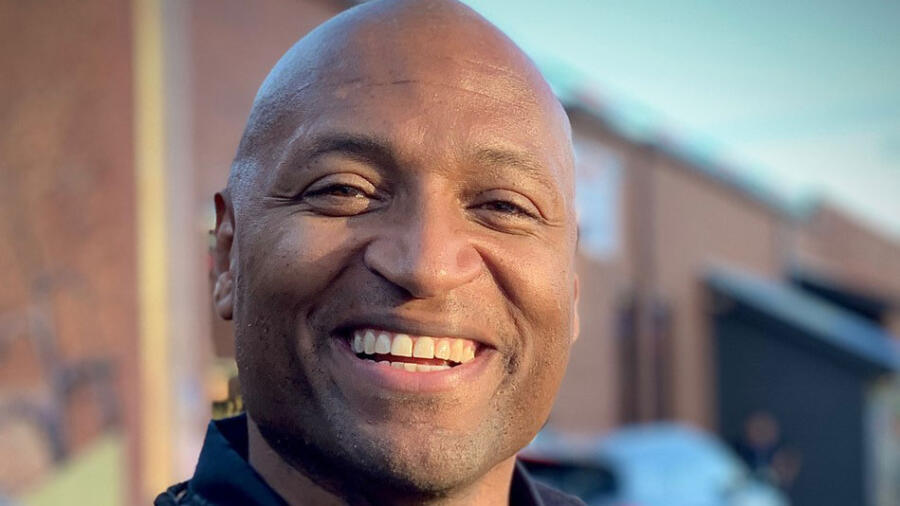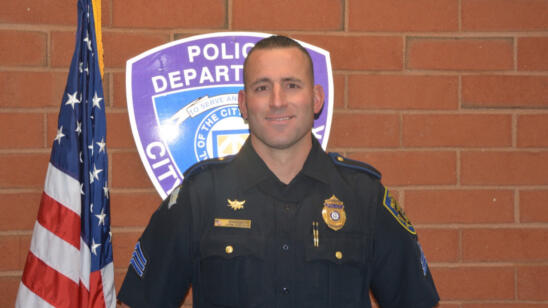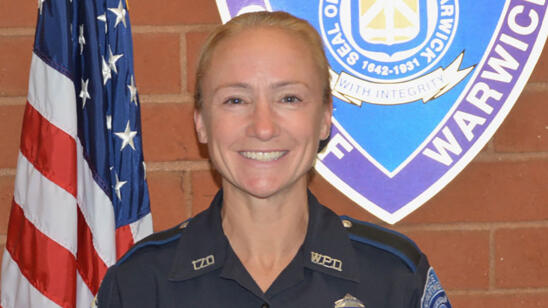After his brother was murdered more than two decades ago, Officer Darrell Ross saw what he calls “a recognizable gap between the community and law enforcement.” Originally from the Philadelphia area, he set out for a career within law enforcement, and has been with the Tulsa Police Department since 2011. He spoke with A&E True Crime about maintaining a personal connection with the citizens of Tulsa.
How did losing your brother affect your path, professionally?
It changed what I wanted to do with my life. In the place where we grew up, people didn’t really talk to the police very much. Justice happens when people are willing to talk and step forward and be a part of the solution—not just the problem. So rather than just say, ‘Oh, why didn’t somebody do something?’ now I can be a part of the people who are trying to do something.
How did you feel about law enforcement before that?
I didn’t view the police as the opposition. I would say my encounters over time had not been overly negative or overly positive.
Tell me about your high school experience and how that fits into your life now.
I went to a performing arts high school. We all learned to sing, and I played the piano. I learned the trombone and acting as well. So I really got a sense for theater, and how to change the role I’m playing when I’m interacting with people and communicating with people.
I don’t mind working and talking with a crowd of people. So when I have the opportunity to speak at a community meeting, or even have people for a ride-along, that sense of being able to work with people and talk to people is very valuable. It’s helped me a lot in my current job.
You place a lot of importance on cultural competency. What is cultural competency and what makes it important?
Cultural competency is recognizing that as individuals, we have multiple cultures that we come from. And when I say culture, I don’t just mean race or religion. As a guy, guys have a guy culture. As a Black guy, I have a Black guy culture. As a tall guy, I have a tall guy culture. All these things create perspectives. Then when I talk to another person or look at another person, I have to recognize that they have multiple cultures that they’re coming from as well.
What have you learned from watching other officers on ‘Live PD’?
There is no one way to do anything. Lots of departments have different ways of coming at the same solution. If they try something, how can I take what they’ve tried and improve on it? Officers in general have a lot to learn from each other.
What has been your most memorable moment on the job?
I helped assist with a childbirth a few years ago. It was a department traffic stop. The guy I pulled over was driving really badly, and I thought he was a drunk driver at first. He said, ‘A friend of mine is having a baby, right around the corner, if you’ll take me to her.’ He was really nervous and covered in sweat, but he didn’t smell like alcohol.
I followed him to where he said his friend was giving birth. Inside of about two minutes, I had additional cars there, our emergency medical service was on its way. They put me on the phone with one of their dispatchers, who walked me through the home process. My backers are holding the phone, holding the flashlight—all kinds of chaos is going on. And the baby starts to come out. Two firefighters, who are buddies of mine, walk in and I’m like, ‘Go guys, do your thing!’ They were awesome. It was an awesome moment for all of us.
What is the best thing about what you do?
When I see a success story. We see so many people on their most awful day. So when you make contact with someone where [our interaction] actually worked, it’s like, Wow, all the things I’m doing are actually helping somebody.
A couple of months ago, a lady approached me in court, and she said, ‘Hey, I just wanted to let you know we talked a couple of years ago, and it worked.’ She went to the effort of actually coming to the courthouse to find me, to tell me that she hasn’t been in any trouble and she has been off drugs. That was an amazing moment for me. I got through to this person.
What do you do in your free time?
I build things. I have a honey-do list to get stuff done around the house. I’m my kids’ driver on their days off. They’re 7 and 13.
What does your family think about what you do?
They think it’s OK, but I’m a weird dad and at any given moment I can embarrass them. They keep me humble. They sometimes watch ‘Live PD,’ and sometimes they don’t.
What do you think about what you do?
I love what I do because of the people I work with. They make my job so much fun and at the same time, they make it safe. I work with men and women who are very competent, very skillful and very smart. The squad I work with, we’ve been together for a few years. We were brought together by a sergeant who was just an awesome guy to work for—Bob Rohloff. He’s retired now, but he brought together this team of people who love each other.
We’re friends outside of the job, we keep each other safe at the job, and we make sure we go home to our families at night. I can’t ask for a better situation than that.
Related Features:
Cpl. Mark Laureano of ‘Live PD’ on His Military Background and What Keeps Him Going Every Day
Dep. Addy Perez of ‘Live PD’ on Transitioning from the Military to Law Enforcement
Senior Deputy Garo Brown of ‘Live PD’ on That ‘Licensed Crack’ Moment
Deputy Sheriff Danny Brown: Connecting With Community Members—and Other ‘Live PD’ Cops


